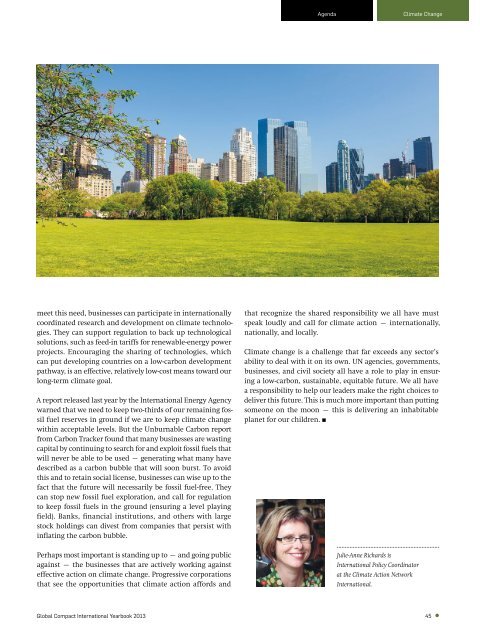Global Compact International Yearbook Ausgabe 2013
The UN Global Compact is the world’s leading platform for corporate sustainability. In describing the future aims of the Global Compact, UN Secretary-General H.E. Ban Ki-moon says: “A growing number of business in all regions recognize the importance of reflecting environmental, social, and economic considerations in their operations and strategies. Now the challenge is to move from incremental process to transformation – in society and markets alike.” The new 2013 edition of the Global Compact International Yearbook offers proactive and in-depth information on key sustainability issues and focuses on recent developments of stakeholder management such as managing corporate legitimacy, for example. Concomitant to this is the call for a more holistic reporting of companies’ financial and nonfinancial performance, which is expressed in the idea of integrated reporting. Furthermore, this edition highlights the connection between the sustainable development of African societies and the ways of managing and governing their natural wealth. The newest developments concerning the move toward a low-carbon economy are shown in the chapter on climate change, which emphasizes the importance of reducing the output of greenhouse gases. Corresponding to the idea of mutual learning, the Global Compact International Yearbook includes 43 good practices of corporate participants that showcase different approaches to the implementation of the Ten Principles of the Global Compact. The Global Compact International Yearbook is a product of the macondo media group and United Nation Publications in cooperation with the Global Compact Office in support of the UN Global Compact and the global advancement of corporate sustainability. It contains 196 pages.
The UN Global Compact is the world’s leading platform for corporate sustainability. In describing the future aims of the Global Compact, UN Secretary-General H.E. Ban Ki-moon says: “A growing number of business in all regions recognize the importance of reflecting environmental, social, and economic considerations in their operations and strategies. Now the challenge is to move from incremental process to transformation – in society and markets alike.”
The new 2013 edition of the Global Compact International Yearbook offers proactive and in-depth information on key sustainability issues and focuses on recent developments of stakeholder management such as managing corporate legitimacy, for example. Concomitant to this is the call for a more holistic reporting of companies’ financial and nonfinancial performance, which is expressed in the idea of integrated reporting. Furthermore, this edition highlights the connection between the sustainable development of African societies and the ways of managing and governing their natural wealth. The newest developments concerning the move toward a low-carbon economy are shown in the chapter on climate change, which emphasizes the importance of reducing the output of greenhouse gases.
Corresponding to the idea of mutual learning, the Global Compact International Yearbook includes 43 good practices of corporate participants that showcase different approaches to the implementation of the Ten Principles of the Global Compact. The Global Compact International Yearbook is a product of the macondo media group and United Nation Publications in cooperation with the Global Compact Office in support of the UN Global Compact and the global advancement of corporate sustainability. It contains 196 pages.
You also want an ePaper? Increase the reach of your titles
YUMPU automatically turns print PDFs into web optimized ePapers that Google loves.
Agenda<br />
Climate Change<br />
meet this need, businesses can participate in internationally<br />
coordinated research and development on climate technologies.<br />
They can support regulation to back up technological<br />
solutions, such as feed-in tariffs for renewable-energy power<br />
projects. Encouraging the sharing of technologies, which<br />
can put developing countries on a low-carbon development<br />
pathway, is an effective, relatively low-cost means toward our<br />
long-term climate goal.<br />
A report released last year by the <strong>International</strong> Energy Agency<br />
warned that we need to keep two-thirds of our remaining fossil<br />
fuel reserves in ground if we are to keep climate change<br />
within acceptable levels. But the Unburnable Carbon report<br />
from Carbon Tracker found that many businesses are wasting<br />
capital by continuing to search for and exploit fossil fuels that<br />
will never be able to be used – generating what many have<br />
described as a carbon bubble that will soon burst. To avoid<br />
this and to retain social license, businesses can wise up to the<br />
fact that the future will necessarily be fossil fuel-free. They<br />
can stop new fossil fuel exploration, and call for regulation<br />
to keep fossil fuels in the ground (ensuring a level playing<br />
field). Banks, financial institutions, and others with large<br />
stock holdings can divest from companies that persist with<br />
inflating the carbon bubble.<br />
Perhaps most important is standing up to – and going public<br />
against – the businesses that are actively working against<br />
effective action on climate change. Progressive corporations<br />
that see the opportunities that climate action affords and<br />
that recognize the shared responsibility we all have must<br />
speak loudly and call for climate action – internationally,<br />
nationally, and locally.<br />
Climate change is a challenge that far exceeds any sector’s<br />
ability to deal with it on its own. UN agencies, governments,<br />
businesses, and civil society all have a role to play in ensuring<br />
a low-carbon, sustainable, equitable future. We all have<br />
a responsibility to help our leaders make the right choices to<br />
deliver this future. This is much more important than putting<br />
someone on the moon – this is delivering an inhabitable<br />
planet for our children.<br />
Julie-Anne Richards is<br />
<strong>International</strong> Policy Coordinator<br />
at the Climate Action Network<br />
<strong>International</strong>.<br />
<strong>Global</strong> <strong>Compact</strong> <strong>International</strong> <strong>Yearbook</strong> <strong>2013</strong> 45

















